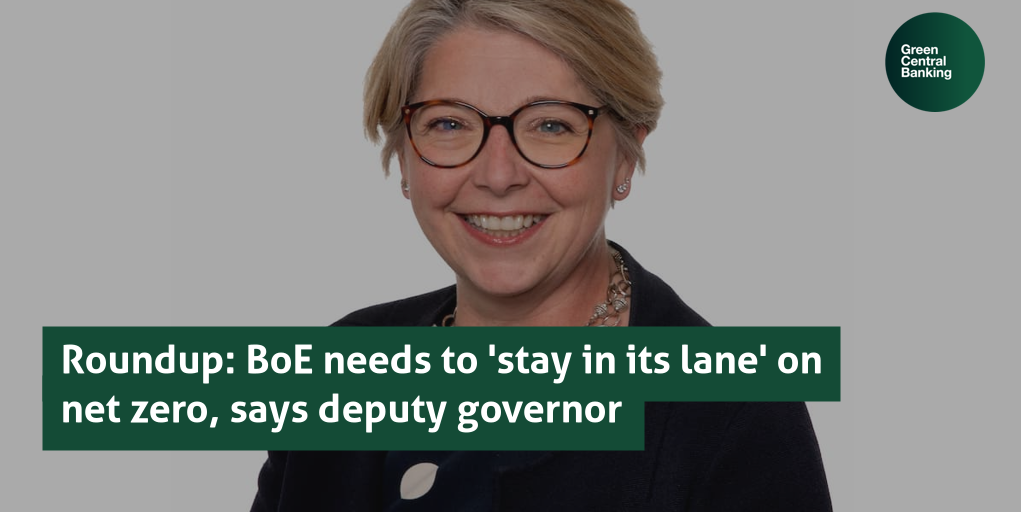A Bank of England official says the central bank needs to stay in its “swim lane” regarding net zero while Asia’s share of renewable energy is growing even as the global outlook on climate action remains uncertain. And the ECB’s Frank Elderson says the EU’s simplification push could increase costs for banks. All this and more in the latest roundup.
BoE should not comment on political debate over net zero
The Bank of England needs to stay in its “swim lane” when it comes to financial risk from climate change and should not engage in the political debate around net zero, said Sarah Breeden, deputy governor for financial stability.
“The pathway to net zero is one for elected politicians to choose. What we need to do is to make sure that banks, insurers, the financial system, are ready to manage the risks, whatever that pathway is,” she said at a Financial Times event.
The UK has a legally binding target to reach net-zero carbon emissions by 2050, but its targets have come under attack by conservative and rightwing politicians, who say the timeline is impossible and should be abandoned.
Renewable energy share growing in Asia, MAS chief says
The share of renewable energy in some parts of Asia already accounts for a large part of energy demand, said Chia Der Jiun, managing director of the Monetary Authority of Singapore (MAS).
He pointed to China, where wind and solar surpassed fossil fuel power for the first time in March, as well as the Philippines, Thailand and Cambodia where renewable energy costs have fallen below coal-generated electricity.
“In Asia, enabling energy transition will be key to transitioning our economies,” he said, while also noting that the global outlook for climate action is becoming more uncertain, with private coalitions pulling back and corporations becoming more cautious.
EU simplification push could increase bank costs, says ECB’s Elderson
The EU’s omnibus proposal could increase bank costs if key data points are missing, European Central Bank executive board member Frank Elderson warned.
“If this were to happen, banks would either no longer be able to conduct adequate risk management, or they would have to resort to requiring additional data from their clients on top of the current regulatory regime, which would clearly be burdensome,” he said.
The rollback on disclosure rules could also undermine the playing field, but he acknowledged that simplifying regulations could lead to more efficiency if done correctly.
EBA could resist calls to simplify EU climate reporting rules
The European Banking Authority (EBA) has hinted that it could resist pressure to simplify reporting requirements under the EU’s omnibus proposal.
The regulator told Environmental Finance it was analysing a consultation on ESG scenario analyses but noted that “risk management is not just a regulatory requirement for banks, it is one of their main functions and responsibility of their management boards”.
“Thus, ESG risk management principles for financial institutions should not be driven by reporting requirements. While we are aware of, and attach importance to, the need for simplified regulations, EBA guidelines cannot depend directly on the content and scope of the [corporate sustainability reporting directive].”
SNB sells its stakes in oil giant Chevron
The Swiss National Bank (SNB) sold all its shares in Chevron, according to an analysis of its first quarter filings. The central bank has a substantial holding and invests regularly in US stocks and files quarterly reports of its findings with the Securities and Exchange Commission.
Central banks face pressure from stakeholders and civil society groups to decrease their investment in fossil fuels. The SNB has not explained its reason for selling its Chevron shares. However, it still has a USD$1.4bn stake in Exxon.
Research reports
France’s Green Horizon: Supply-Side Drivers for a Competitive Transition in Export Markets
This Banque de France research paper finds that France risks falling behind its European counterparts on the green transition due to limited fiscal support and green innovation gaps.
Sustainable Corporate Governance and Corporate Carbon Outputs
In this paper, the authors find that board gender diversity is positively connected to the carbon reporting and performance of a company, suggesting a company with broader social inclusion is also more likely to consider carbon issues.
Toward Paris-aligned Sovereign Investment Portfolios: Utilizing Implied Temperature Rise as a Measure of Alignment.
With more Paris-aligned investment portfolios being adopted, this paper argues that using an implied temperature rise metric is a better way to assess how a portfolio rates as it is less volatile and more accurate than other methodologies.
Call for comments
The Taskforce on Nature-related Climate Disclosures is conducting a survey to understand nature-related assessment and reporting practices worldwide. The deadline to respond is 1 August. Results will be released during Climate Week NYC in September.
The European Commission launched a call for evidence on the sustainable finance disclosure regulation to simplify the framework, enhance its usability and prevent greenwashing. The deadline is 30 May.
This page was last updated May 27, 2025
